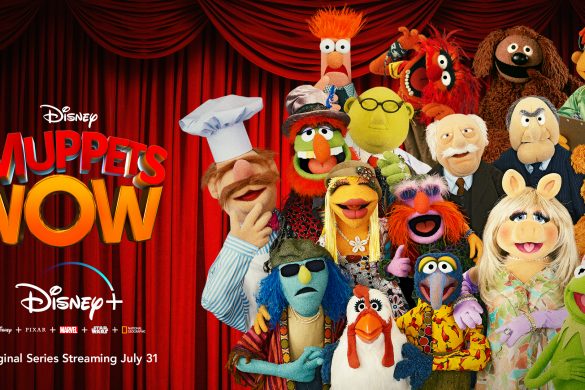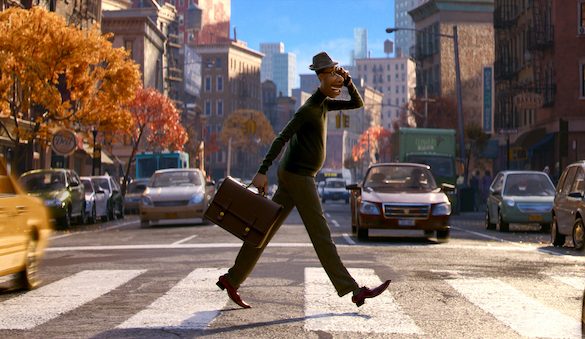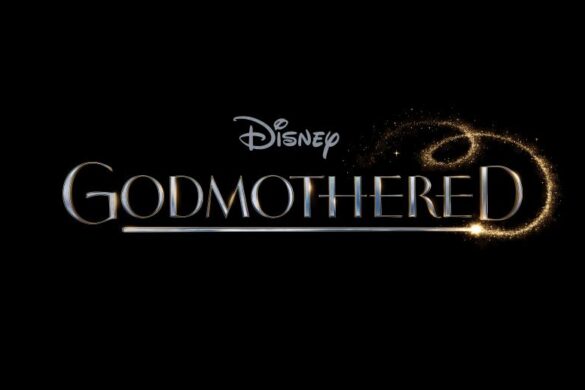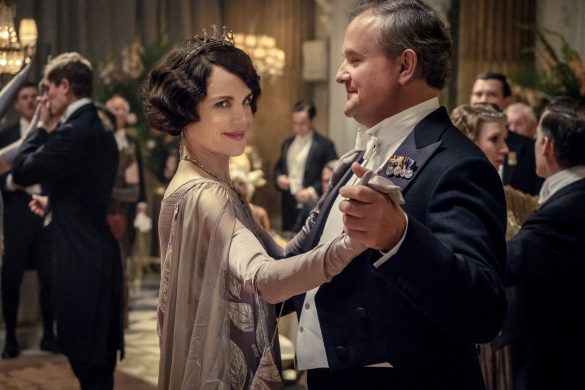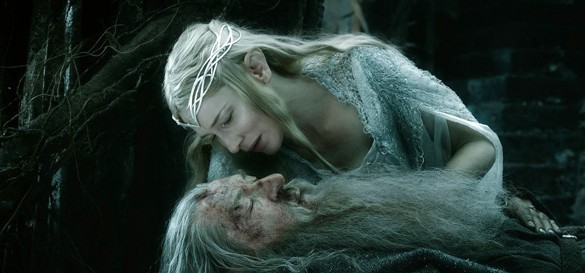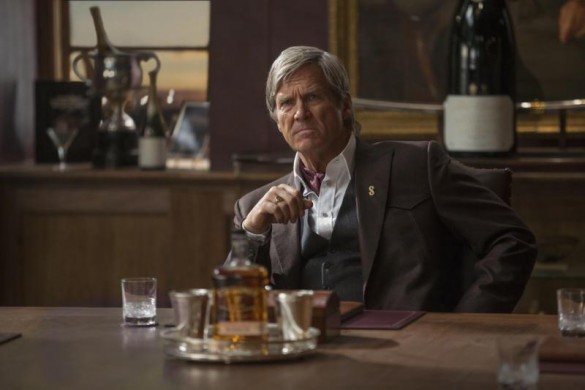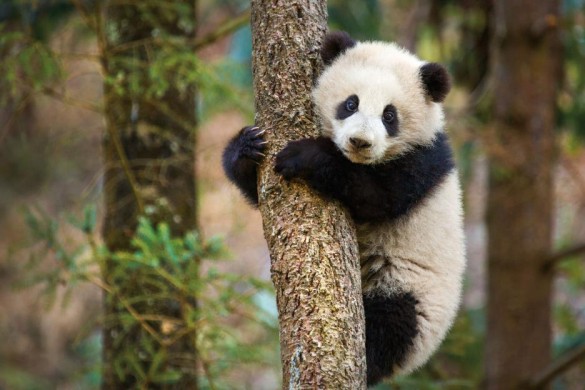While the original Harry Potter films opened the door to the Wizarding World, the Fantastic Beasts prequel hasn’t quite caught up to its potential as an expansive series. Though “Where to Find Them” showed promise, its sequel “The Crimes of Grindlewald” was convoluted and more a place card filler than an all-important chapter to the five-film series. Luckily, setting the bar low would make “Fantastic Beasts: The Secrets of Dumbledore” a better film. However, that might not be saying much since it lacks the magic of the first because it doesn’t seem to be concerned about fantastic beasts, Albus Dumbledore’s (Jude Law) secrets, or validating the need for these films.
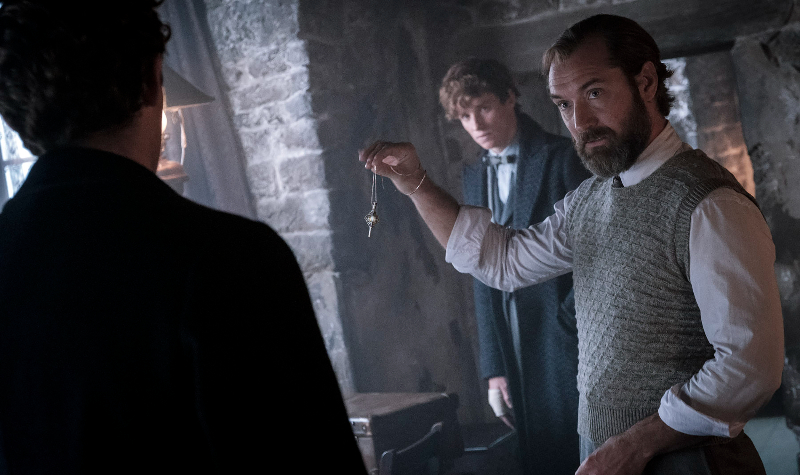
“The Secrets of Dumbledore” opens with a bit of exposition over tea between Dumbledore and Grindelwald (Mads Mikkelsen replacing Johnny Depp). Though the two shared a loving bond, its clear differing ideas and opinions about Wizards, Witches, Muggles, and No-Maj are the source of their split. They created a blood oath that prevented them from attacking each other. But the real secret isn’t so much the character’s sexual identity but the dirty little secret that seems to be kept in the family closet. And that’s Credence Barebone (Ezra Miller) is a Dumbledore – which isn’t so much a secret considering that it was alluded to at the end of the second film.
“The Secrets of Dumbledore” takes us to Newt Scamander (Eddie Redmayne) searching for a pregnant qilin – think a scaly version of Bambi. The qilin serves as the film’s MacGuffin, whose purpose is poorly explained. However, it feels like qulin was created only to remind fans and audiences that the series has fantastic beasts. But as Newt begins to tend to the mother and put them in his magical protective case, he is attacked by Credence, who retrieves the baby qilin for Grindlewald. But what he doesn’t know is that the mother qilin gave birth to twins.
To say that these Fantastic Beasts films have a place within the more extraordinary Wizarding World would be mildly disingenuous. Though there are connections to the original Harry Potter films, the series doesn’t expand the mythology or add any value to it. Its lack of direction or endpoint is even more problematic. The characters themselves look confused about what’s happening. And no spell could wipe that look away.
Yes, Grindelwald has declared war on the Muggles and No-Maj. IN between the events of “The Crimes of Grindelwald” and “The Secrets of Dumbledore,” he has massed significant following, which includes himself, Credence, Queenie (Alison Sudol), and many others. Not only has the dark wizard hatched a plan to clear his name, but he has created a secret alliance with a wizarding politician who plans to name Grindlewald as a front-running candidate in the election of President of the International Confederation of Wizards.
At first, the election and politics give the Wizarding World added depth, but we hardly get to spend time on the candidate’s stances or how politics function within this world. Even the plot to acquit himself seems contrived and readily accepted by those who would typically question such circumstances. As such, the entire judicial process in this film doesn’t hold as much meaning as the characters suggest. Nor does the election process itself since it doesn’t give us a chance to hear their campaign. This leads us to the qilin, who selects the leader based on the purity of one’s heart. Of course, with Grindlewald in possession of one, he devises a way to spellbind it in a way that will make it choose him. But even that doesn’t feel integral to the story as it has to juggle multiple subplots, none of which feel essential to the film or the series. One might say that dropping any subplots is inconsequential and wouldn’t affect the film.
Knowing Grindlewald will do what it takes to carry out his war on the muggles, Dumbledore recruits Newt, his brother Theseus (Callum Turner); his assistant Bunty (Victoria Yeates); the baker Jacob Kowalski (Dan Fogler); charms professor Eulalie “Lally” Hicks (Jessica Williams); and Yusuf Kama (William Nadylam) to his team. Each of them has varying tasks to accomplish to defeat Grindlewald, taking audiences to different locations around the Wizarding World. Unfortunately, none of them look exciting or memorable because of their lack of magic and uniqueness.
The election process, expanding mythology, and new elements would generally add to the world-building, but the lack of inspiration and originality doesn’t give us much to care about. Everything looks cold and lifeless. There’s nothing remotely interesting about the locations we’ve already seen other than reestablishing some character work and settings. Even the finale’s Bhutan setting is just there for the sake of being there. Sure it looks pretty, and the shell game Dumbledore plays is whimsy, but by this point, it is better if it ends sooner than later.
And for a film to title itself “Fantastic Beasts” and use a subtitle like “The Secrets of Dumbledore,” neither plays a critical role, at least not in the way the film promises. As aforementioned, the magical creatures may look tangible, despite their CGI renderings, but they lack creativity and originality. None of them feel particularly inspirational because they aren’t given much to do outside of being a MacGuffin. Even Newt’s purpose feels reductive because the film has shifted away from expanding the Wizarding World through the search for them.
As for those secrets, the reveals aren’t as jaw-dropping as initially intended by screenwriter J.K. Rowling. There’s this thought these reveals would have a more significant impact on the story and future events. But since, they don’t hit nearly as hard as they should because the characters themselves don’t seem to be as interested in discovering these secrets. And if they don’t care, why should we.
But if there’s anything that keeps fans and audiences fully engaged with “The Secrets of Dumbledore,” it’s Lally and Jacob’s mission. Their dynamic is that wonderful spark that keeps the film remotely interesting. With Lally’s wit and courageous spirit paired with Jacob’s heart of gold and wizardly ineptness, the two are not only able to create some exciting wizard wand action sequences but also a few laughs. And while Williams is best known for her comedy, her role shows her versatility as she can do more than bring a few laughs. Moreover, her mere presence is an inspiration – one made too late given that it’s taken 11 films to happen – as she helps a depressed Jacob find the confidence in himself to be worthy of the wand he’s been given. Not only that, but she is more than capable of taking care of herself without the help of others. Honestly, I wanted to see more of her and Jacob than anyone else.
Jacob serves as the pov character for the rest of us who may not be familiar with the Wizarding World. And Fogler has done an excellent job maintaining that characterization throughout the three films. He is just as dumbfounded as we are whenever trying to understand how magic works and is amazed when he experiences the magical transportations and consumption of giggle juice for himself. The film is also unintentionally meta, as Jacob appears to be just as confused about Dumbledore’s plan as we are.
Yet, the fact remains that those two are supporting characters in a film that was initially designed to be more about Newt and his search for the titular magical creatures. Instead, he’s been reduced to being a supporting character. He isn’t given much to do and hardly expresses a sense of urgency despite the enormous stakes. While he still retains much of that reluctant hero thrust into saving the world, the film has to split its time between the varying stories. The film doesn’t invest the time that it should that would allow him to feel like the heroic character as initially intended to be. While he may get to be one in a prison break set piece that involves him swiveling to avoid deadly manticores so that he can save his brother. It may create a few laughs and some excitement from the danger, but it doesn’t feel like it serves much of a purpose or has a place in the larger story.
Though we are already three films into the series, it feels like “Fantastic Beasts” has no sense of direction or how it wants to end. While the idea is that these films serve as a prequel to the Harry Potter films, they haven’t established why they are such an essential part of the Wizarding World. But the reality is that the further these films go on, they reveal themselves to be an unnecessary experience to the Harry Potter mythology.
7/10
Fantastic Beasts: The Secrets of Dumbledore in theaters April 15, 2022


